30 October 2023
![]() 11 mins Read
11 mins Read
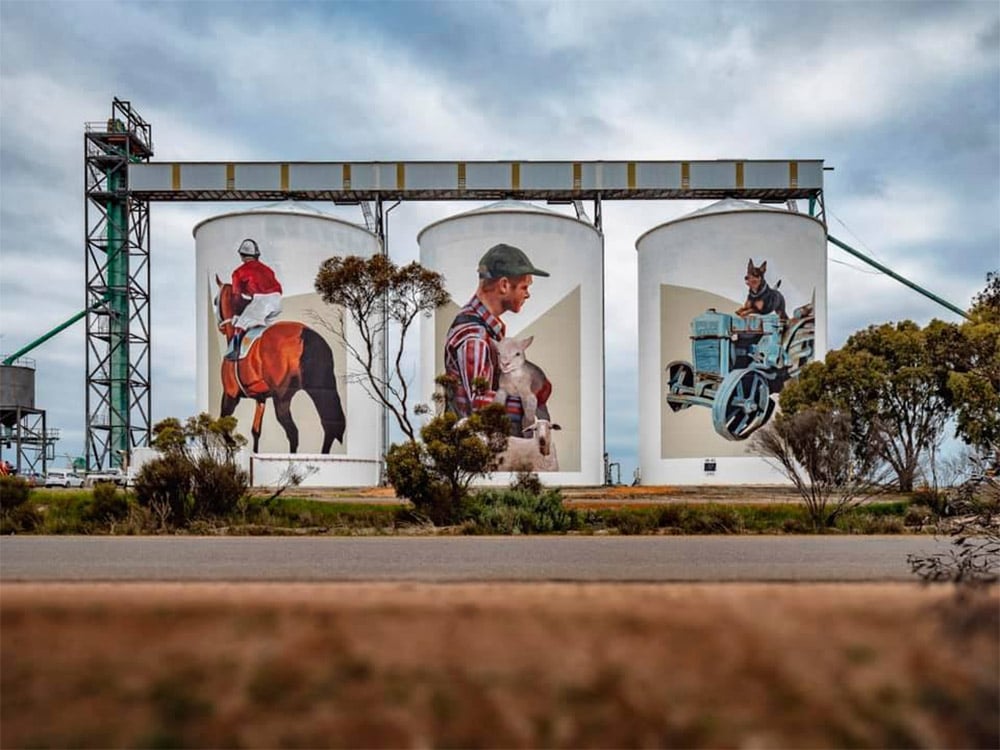
With travelling the world still off limits, Australians are embracing the many joys of travelling their own country. But with state borders opening and closing, and many accommodation offerings booked out a year in advance, it can also be a process that is full of frustration.
Which is why the Australian Traveller team have come up with our list of up-and-coming destinations in each state to help you get ahead of the crowds. You can also read our exclusive list of Australia’s 100 best towns, for further travel inspiration.
Boomerang Beach (and neighbouring Blueys) is so off-the-radar that we have barely written about it ourselves. Framed by Booti Booti National Park and the kinds of deserted, white-sand beaches Australia is known for, Boomerang is what Byron Bay locals wish their township was like.
It’s the stuff nostalgic family beach holidays are made of – swimming, barbecues, bushwalking, fishing, surfing and devouring salty fish ‘n’ chips as the sun goes down.
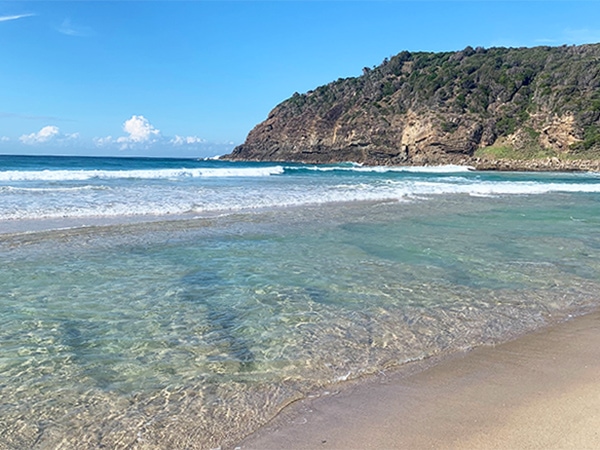
Swim in the crystal clear waters of Boomerang Beach.
Located in the foothills of the NSW Snowy Mountains, every season in Tumut offers something different.
Summer brings cool, clean and fast-moving waters perfect for trout fishing; Kosciuszko National Park brings the autumnal colours Tumut is famous for; skiing enthusiasts arrive in winter, as the Snowys are covered in a blanket of snow; and wildflowers burst into life on the edges of the Tumut River as spring emerges. Fun fact: In 1908, Tumut was one of the nine towns shortlisted to become Australia’s capital. Take a trip there and it will all make sense.
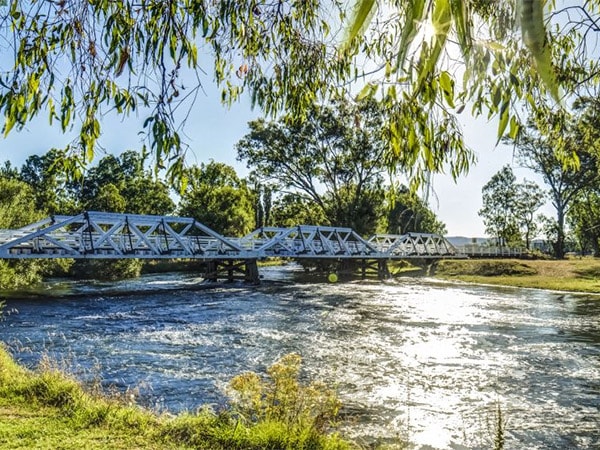
Experience the changing seasons in Tumut.
NSW’s own little Italy is worth a trip for the cannoli alone. Sixty per cent of the Griffith’s residents have Italian heritage, and visitors reap the benefits by way of the world-class wineries, fresh produce and nation-building heritage. Speaking of wineries, some of the most renowned in the country were established in Griffith.
Take a tour though McWilliam’s, De Bortoli, Dee Vine Estate and Yellow Tail while you’re in town.
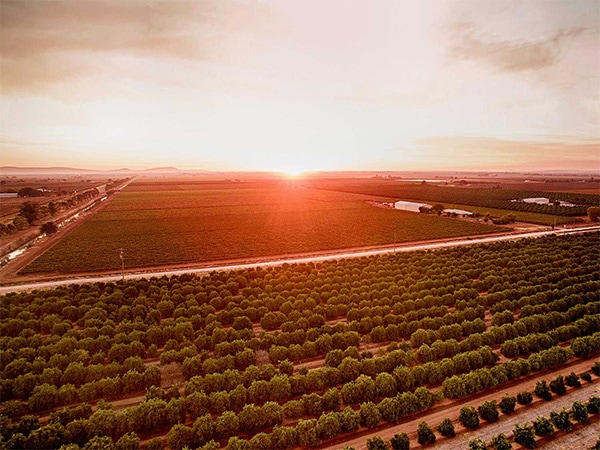
Enjoy the gourmet delights of Griffith.
It’s been a hell of a year for the coastal fishing town of Mallacoota. Surrounded by 87,500 hectares of natural forest courtesy of Croajingolong National Park, this population 900 town was devastated by bushfires in the summer of 2019/20.
The sepia skies made international headlines, blasting a heart-rending image of the devastation of the fires to the country and world. Thankfully, the regeneration of Mallacoota is well and truly underway and they are welcoming back visitors once more.
The town’s remoteness is the major drawcard for city folk looking for a quiet holiday experience, while its northern climate takes advantage of the state’s warmest winter temperatures and fresh ocean breezes, making it a year-round destination.
Read more about Mallacoota’s renaissance here.
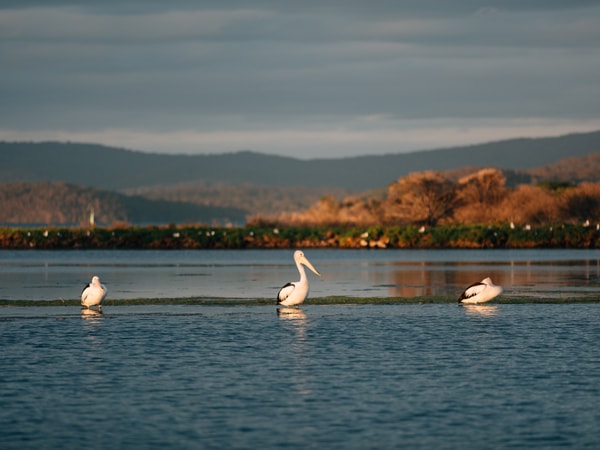
Pelicans drift nonchalantly on the lake in Mallacoota. (Image: Andrew Northover)
Step back in time to the historic town of Echuca, sitting proudly on the banks of the Murray River. Echuca is known far and wide as the paddle steamer capital of Australia, and its port – which was built in 1980 – was lovingly restored to its former glory. Today it serves as a local hangout, packed with steamer rides along the Murray, museums, replicas and buildings.
Don’t forget to stop at the Star Bar, once an illegal underground drinking hole, complete with the escape tunnel once used to dodge police.
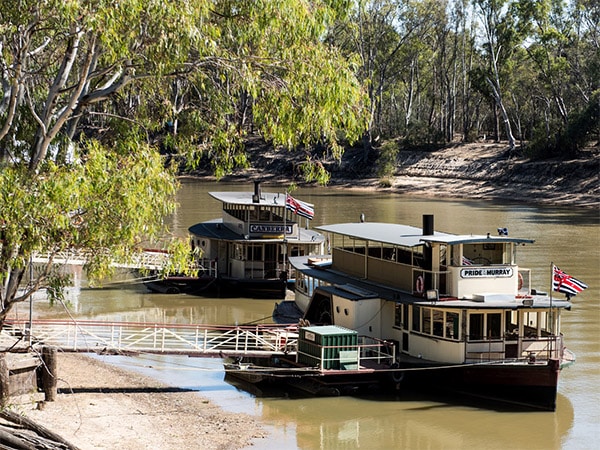
Echuca’s most famous residents.
Clunes is home to so many bookshops that it has been declared an International Book Town – one of only 22 worldwide. This pretty little goldfields hub is just north of Ballarat, and hosts the beloved Booktown Festival each May. They also host Booktown on Sundays featuring free author talks. On any given day, visitors can stroll through the well-read community, taking in some of the state’s best-preserved 19th century buildings, cafes, houses, restaurants and of course, bookshops.
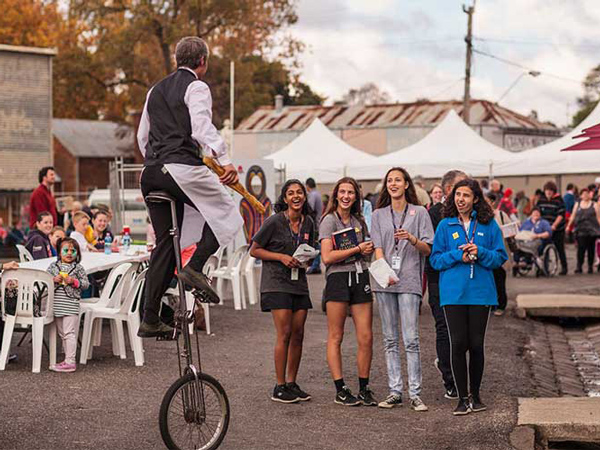
The experience of Booktown is incredibly unique.
In the heart of the Western Australian wheatbelt region, towns like Northam have been reaping the benefits of radical creatives who’s skills have transformed grain silos into art galleries, and small towns into destinations. In 2015, as part of Perth collective FORM’s festival of art and ideas, international artists Hense (USA) and Phlegm (UK) created Australia’s first ever silo mural.
Eight grain silos in the town of Northam were transformed into towering art installations brought to life with colour and awe-inspiring detail. Take a trip to see the countryside and get a culture fix at the same time. Find out more about WA’s self-guided silo art trail here.
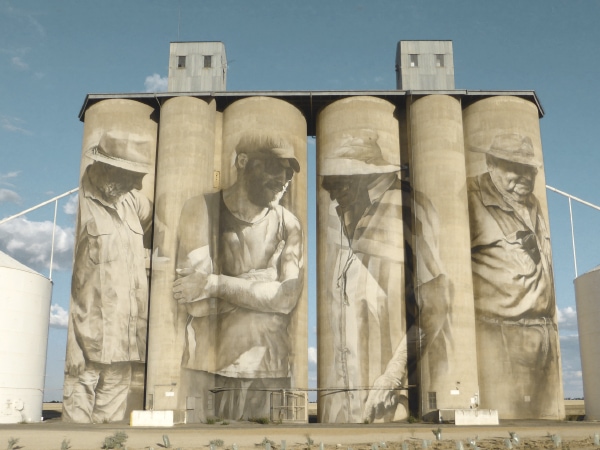
Guido van Helten’s incredible silo art is attracting visitors.
There isn’t much going on in Eagle Bay – which is the entire beauty of it. Taking a trip here means slowing down and relaxing in this gobsmacking beautiful slice of paradise. It’s the place where Perth’s rich and famous have their holiday homes. Shallow waters equate to great snorkelling and fishing spots.
The bay forms a crescent, broken only by the interesting punctuations of nearby Sugarloaf and Castle Rocks. It’s like stepping onto an exquisite tropical island. While there isn’t much need to leave Eagle Bay, it’s also considered a tranquil base to explore the rest of the Margaret River area.
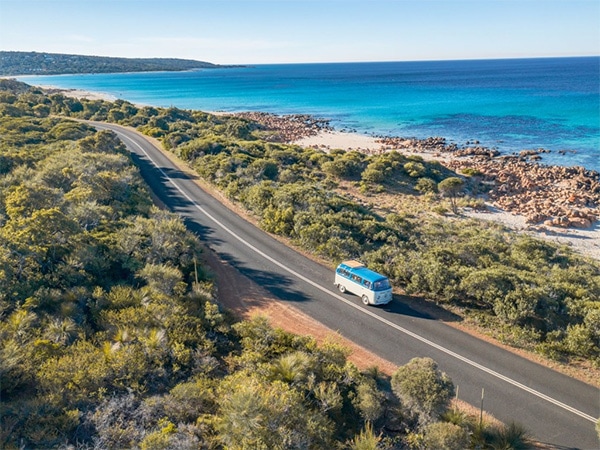
Take a trip to Eagle Bay.
Drive straight through the Kimberley in WA’s rugged northwest all the way from Wyndham along the legendary Gibb River Road and the first town you’ll come to is Derby.
Derby once served the local pastoralists who settled in the area. Isolation and harsh conditions made it exclusively home to sheep stations until a jetty was built to service the thousands who flocked to WA during the gold rush and pearling boom.
These days, Derby serves as a great historical landmark. The original jetty also still stands, boasting a great spot for a stunning over-water sunset. The Centenary of Federation Pavillion details the history and geography of the area and features a brilliant 28m2 mosaic tile floor depicting facets of life in the district, as well as the creation stories of the Kimberley.
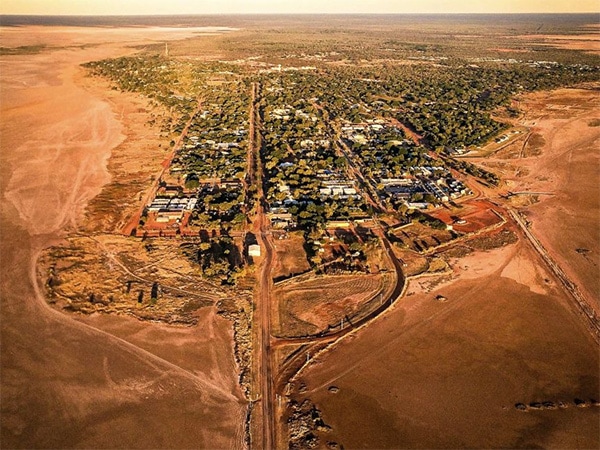
Derby is one of Western Australia’s most remote towns.
With a population of three permanent residents and two workers, William Creek is officially the smallest town in South Australia. Despite that, it’s situated smack bang in the middle of the world’s largest working cattle property, Anna Creek Station, which is almost half the size of Tassie.
William Creek can be accessed by the town’s only airstrip, while scenic flights are run during “winter” or any other times when there’s water in nearby Lake Eyre. At 1000 kilometres (14hrs) northwest of Adelaide, it really is in the middle of nowhere.
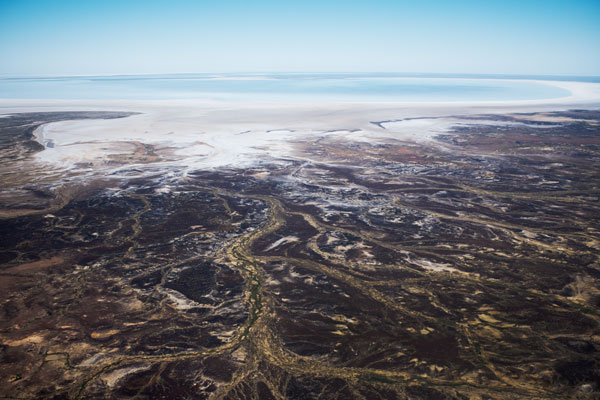
Fly from William creek and trace the tributaries towards Lake Eyre. (Image: Jonathan Cami)
You’ll find a little more than a few guesthouses, a train station and a pub in Parachilna; a tiny town on the edge of the Flinders Ranges in Outback SA.
There might not be much reason to go here, were it not for the iconic Prairie Hotel serving up some unusual pub grub and its proximity to Flinders Ranges. There are no parma’s in sight; instead, order up a Feral Mixed Grill of camel, wallaby, roo and goat on mashed potatoes and gravy.
If that doesn’t take your fancy, there’s always emu and damper, as well as the more commonly consumed rabbit, beef and lamb. Food is served in the restaurant, but many enjoy sitting on the balcony with a cold beer.
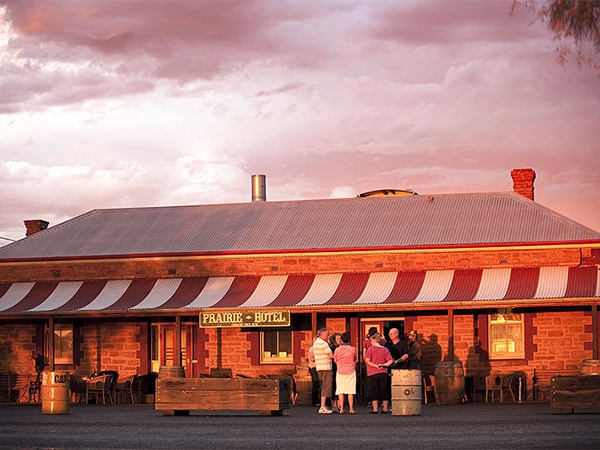
The Prairie Hotel benefits from its proximity to Flinders Ranges.
Emerging from the northeastern edge of Tasmania’s Tamar Valley wine region, overlooking the waters of Anderson Bay, is the sleepy seaport town of Bridport. Known best for sea and river fishing, the best catches in the area are scallops, lobsters and rainbow trout.
Red rocks border the shores of Bridport’s main beach, with a photographic highlight being the eerie site of an old dilapidated pier that’s been half eaten by the waters over the years. Bridport also gives access to one of the top golf courses in the country, Barnbougle Dunes.
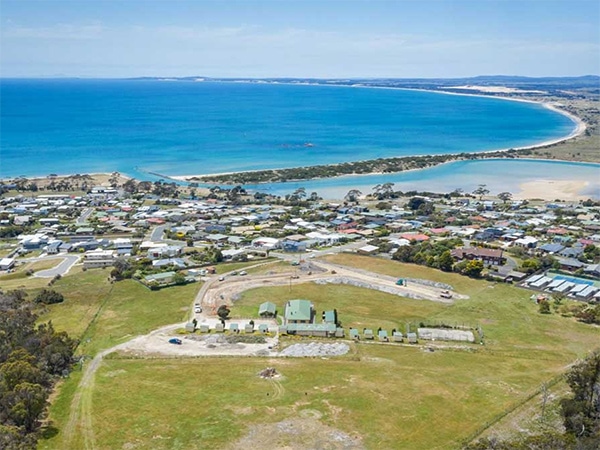
The sleepy seaport town of Bridport.
Rolling hills, Georgian-style buildings and cobblestone streets – it’s a mental image you would usually associate with a quaint English village. Set your sights much closer to home by the banks of the Coal River to find Richmond – southern Tasmania’s postcard-perfect hangout.
Its most famous resident is the Richmond Bridge. Built by convicts in 1823, the bridge is the oldest still in use in Australia and a historic masterpiece to marvel at from every angle.
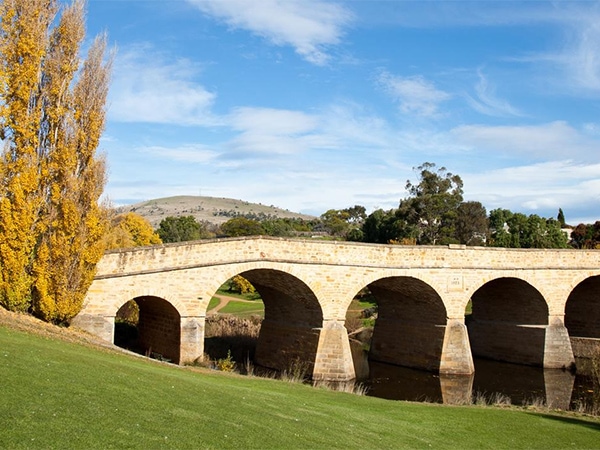
Take a drive over Richmond’s most famous resident.
Stanley is the gem of the underrated northwestern coast of Tasmania. This quaint fishing village enjoys the simple life of crayfish, crabs and sunshine.
Settled in 1826 by employees of the Van Diemen’s Land Company, Stanley is chock full of heritage buildings and cutesy cottages that have tiny doors built for those fortunate to have lived here in the 19th Century. No bustling tourist attractions, restaurants or pubs. Life is alarmingly uncomplicated here.
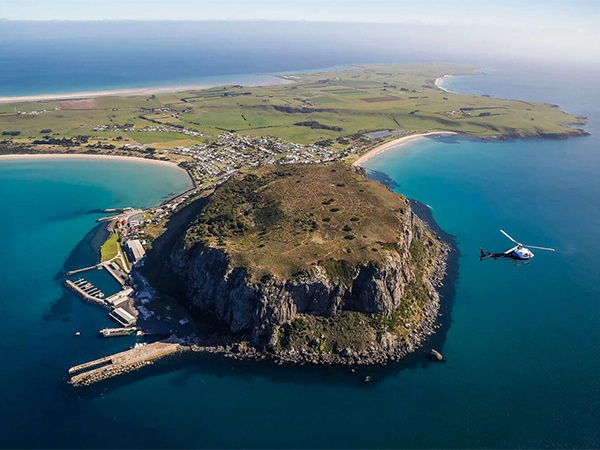
Discover the secrets of Stanley Tasmania.
The Tiwi people have lived on Bathurst and Melville Islands for more than 10,000 years. Their separation from the mainland has fostered a unique culture, music and artwork. There are no didgeridoos or boomerangs here; instead, they make music with clapping sticks and are producing an entirely different style of art than we’ve come to expect from the Aboriginal art movement.
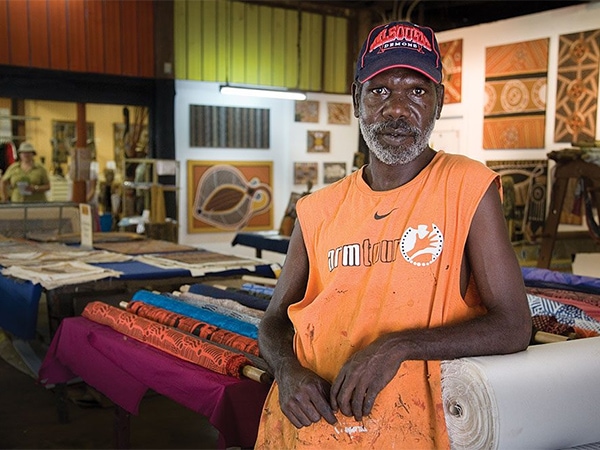
Nguiu Settlement produces a unique style of Aboriginal art.
The stunning Adelaide River twists its way south from the Van Diemen Gulf at Djukbinj National Park, all the way to the Adelaide River settlement on the Stuart Highway south of Darwin. The scenic town, population of just 190, lies on the riverbanks and has a rich and fascinating history.
Initially settled by workers on The Overland Telegraph Line, the town became known as a convenient stopover for miners after gold was discovered nearby in 1892. Adelaide River was also a major military headquarters during WWII and a popular weekend retreat for important military personnel from the NT capital. Its cemetery, a must-see for any Australian, holds many of those killed during the WWII bombing of Darwin.
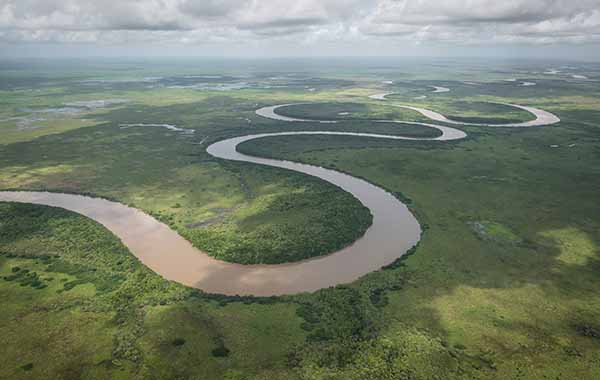
Adelaide River, Northern Territory.
Mataranka is a place that will open your eyes to life in the outback. It was first made famous by the epic We of the Never Never, conjuring up an idea of an impossibly distant place. The celebrated thermal springs are surrounded by the rich forests of Elsey National Park. Several bountiful bushwalks impress even the most experienced trail walker, however it’s accessibility makes it great for beginners and kids.
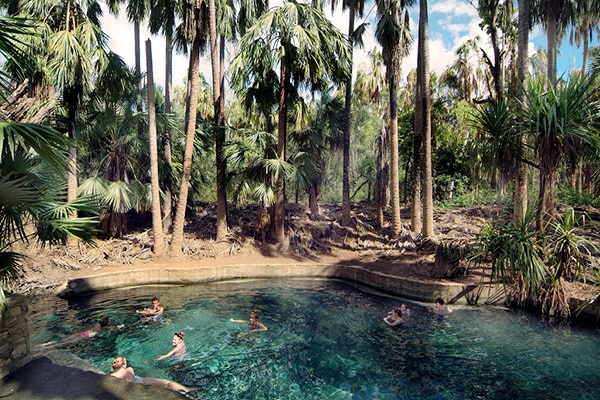
Mataranka Thermal Pool is popular attraction in the busy winter season.
Environmentalists could only dream of a place as magical as this.
Located on the Queensland coast between Bundaberg and Gladstone, Seventeen Seventy sits perched north of Agnes Water along Captain Cook Drive, the state’s northernmost surfing beach. Part of a (for now) largely untouched natural region, it’s a stepping off point to the Great Barrier Reef and is surrounded by four national parks.
Dine in one of the town’s two restaurants or pick up supplies at the general store. But be warned; there’s not much else in town.
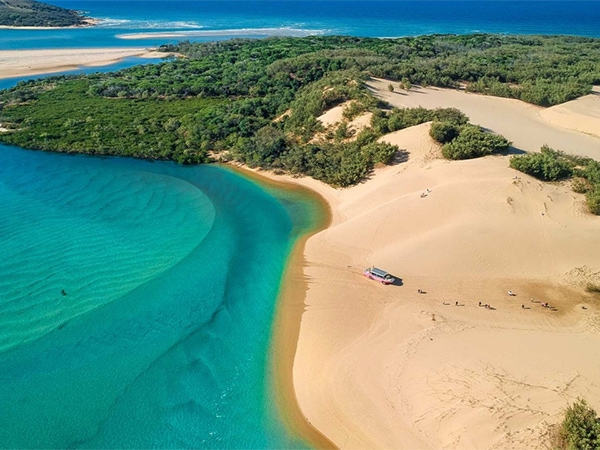
Aerial view of the remote 1770 Inlet.
A cool escape from the hot and frenetic Gold Coast, Tamborine Mountain is a set of three towns: Mt Tamborine, North Tamborine and Eagle Heights. It’s a quaint little oasis perched 560 metres above sea level on the top of the ranges – from here it can look down its nose on its rowdy neighbour, the Gold Coast.
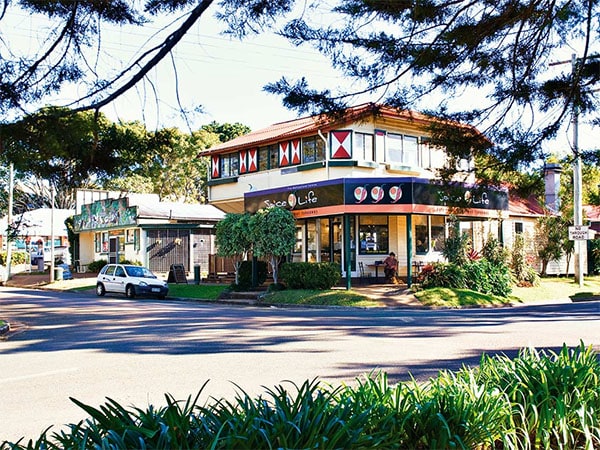
Tamborine Mountain is a serene place to escape the summer mayhem.
Perched only a couple of hundred dusty kilometres from the junction of three states (Queensland, Northern Territory and South Australia) and the vastness of the heartless Simpson Desert lies Birdsville, one of the most isolated towns in Australia.
Step into the famous (and photogenic) Birdsville Hotel and reward yourself with a cold beverage and a bite to eat and marvel at the memorabilia. Unless you’re in town for the Birdsville Races: an Australian outback bucket list item of mythical proportions.
You haven’t truly “done” Queensland until you’ve had a beer at the iconic Birdsville Hotel.
READ MORE: Still want more towns to add to your list? Read which Australian towns have been crowned the friendliest.
Well, this list shows the essence of travelling Australia: off the beaten track, into the never never, maybe not love at first sight, but once you’ve seen it, you are being drawn back time and again, putting you under this Australian spell …
Thanks for including Tumut in the under the radar towns ..it would have been terrific to have highlighted the Tumut Community Labyrinth for Peace as that is a place for all visitors of all ages .The image of the Tumut river and the heritage listed Junction bridge is important ,,the labyrinth is a place for all to include on a river walk ..as they cycle or wander …